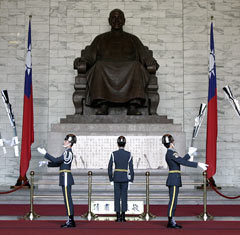
經濟學人「Cultural revolution」這篇專文竟被聯合報倒果為因
聯合報昨天(2007.3.17)第4版的一篇報導,真是欺負信賴媒體的閱報人,其標題:「《經濟學人》報導 去蔣化『像文化大革命』」這樣下對嗎?原文的標題雖為:「Cultural revolution」,但負社會責任的媒體,必須參酌其副標題:「The fight over a dictator’s legacy」及其全文意涵來做客觀的編譯。
其內文:「經濟學人說,民進黨領導人可能企圖藉此在年底立委選舉及明年總統大選前遂行政治操作,但他們將二二八事件定位為台灣人與國民黨「外來政權」間的衝突,不僅再度撕裂台灣社會的舊傷口,也引起北京當局疑慮,一旦台灣與蔣介石劃清界線,可能也會與中國大陸劃清界線。」,但其脈絡還有說:「The current government of President Chen Shui-bian, whose Democratic Progressive Party (DPP) leans towards independence (but which appointed a KMT man as defence minister), intensified its campaign against the generalissimo as the island marked the 60th anniversary of the “228 Incident”—the KMT’s violent suppression of protests against its rule on February 28th 1947. An estimated 28,000 were killed.Blaming the massacres on Chiang and the “outside” regime of the KMT, the DPP announced plans to rename the giant Chiang Kai-shek Memorial Hall in Taipei as the “Taiwan Democracy Memorial Hall”, and tear down the sanctuary’s perimeter wall. The central government dropped “China” from the names of many state enterprises last month. There is talk of removing Chiang’s portrait from Taiwanese coins.」,前因後果,要交代清楚,才是客觀報導。
(原文出處:
http://www.economist.com/world/asia/displaystory.cfm?story_id=8861553)
聯合報報載如下 :
《經濟學人》報導 去蔣化「像文化大革命」
【聯合報/編譯陳世欽/報導】 2007.03.17 04:04 am
最新一期《經濟學人》雜誌以「文化大革命」為題,報導台灣民進黨政府在蔣介石去世卅多年後,積極推動去蔣化,大舉拆除他的塑像,將許多道路重新命名,甚至更改桃園國際機場的名稱,有將這一連串措施與中共文化大革命相提並論之意涵。
報導指出,民進黨此舉已在台灣內部引起政治紛爭,最近並波及國防部長李傑。國民黨以他允許將原本豎立在軍事基地內的蔣介石塑像移走為由,將他開除黨籍。
經濟學人說,民進黨領導人可能企圖藉此在年底立委選舉及明年總統大選前遂行政治操作,但他們將二二八事件定位為台灣人與國民黨「外來政權」間的衝突,不僅再度撕裂台灣社會的舊傷口,也引起北京當局疑慮,一旦台灣與蔣介石劃清界線,可能也會與中國大陸劃清界線。
【2007/03/17 聯合報】@
經濟學人原文如下 :
Cultural revolution
The fight over a dictator’s legacy
Mar 15th 2007 | TAIPEI
From The Economist print edition
http://www.economist.com/world/asia/displaystory.cfm?story_id=8861553
photo from Reuters photo guide: No longer mourned
CHIANG KAI-SHEK may once have been revered as a near-god on Taiwan, where he led his Chinese Nationalist regime after being defeated by Mao Zedong’s Communists on the mainland in 1949. But almost a third of a century after his death, the memory of the old dictator is being effaced, with the removal of the generalissimo’s statues and the renaming of many streets and even Taipei’s international airport.
No longer mournedThis has provoked a political row, which this week engulfed Taiwan’s defence minister, Lee Jye. He was expelled from the Kuomintang (KMT), Chiang’s former ruling party, for allowing statues of the old nationalist to be removed from Taiwan’s military bases.
Chiang’s legacy has never been properly examined in Taiwan. Arguments about the past are also fights over what the island should be in the future: a part of China (the view of Chiang Kai-shek and his political heirs), or an independent nation with a distinct, non-Chinese Taiwanese identity.
The current government of President Chen Shui-bian, whose Democratic Progressive Party (DPP) leans towards independence (but which appointed a KMT man as defence minister), intensified its campaign against the generalissimo as the island marked the 60th anniversary of the “228 Incident”—the KMT’s violent suppression of protests against its rule on February 28th 1947. An estimated 28,000 were killed.
Blaming the massacres on Chiang and the “outside” regime of the KMT, the DPP announced plans to rename the giant Chiang Kai-shek Memorial Hall in Taipei as the “Taiwan Democracy Memorial Hall”, and tear down the sanctuary’s perimeter wall. The central government dropped “China” from the names of many state enterprises last month. There is talk of removing Chiang’s portrait from Taiwanese coins.
DPP leaders may be politicking ahead of parliamentary elections in December, and presidential polls next March. But there is more at stake. By casting the 228 Incident as a clash between Taiwanese and KMT “outsiders”, the DPP has not only opened old wounds in Taiwan but also created anxiety in Beijing. China’s Communists may have been at odds with the generalissimo. But they fear that Taiwan, by breaking with Chiang’s legacy, may also be breaking away from the Chinese mainland.
文章定位:



